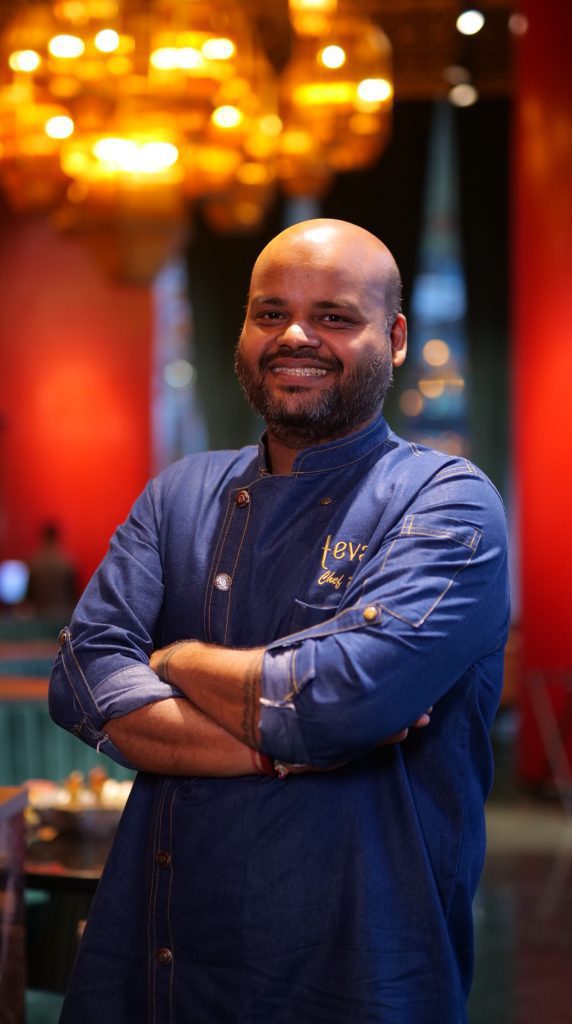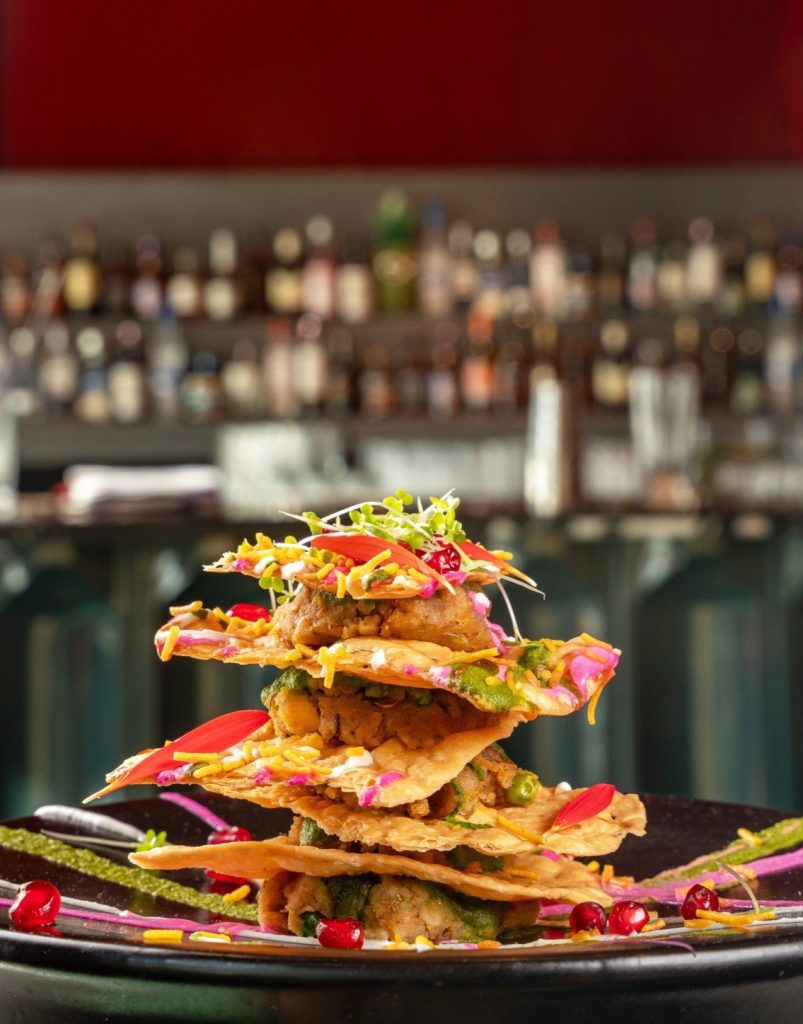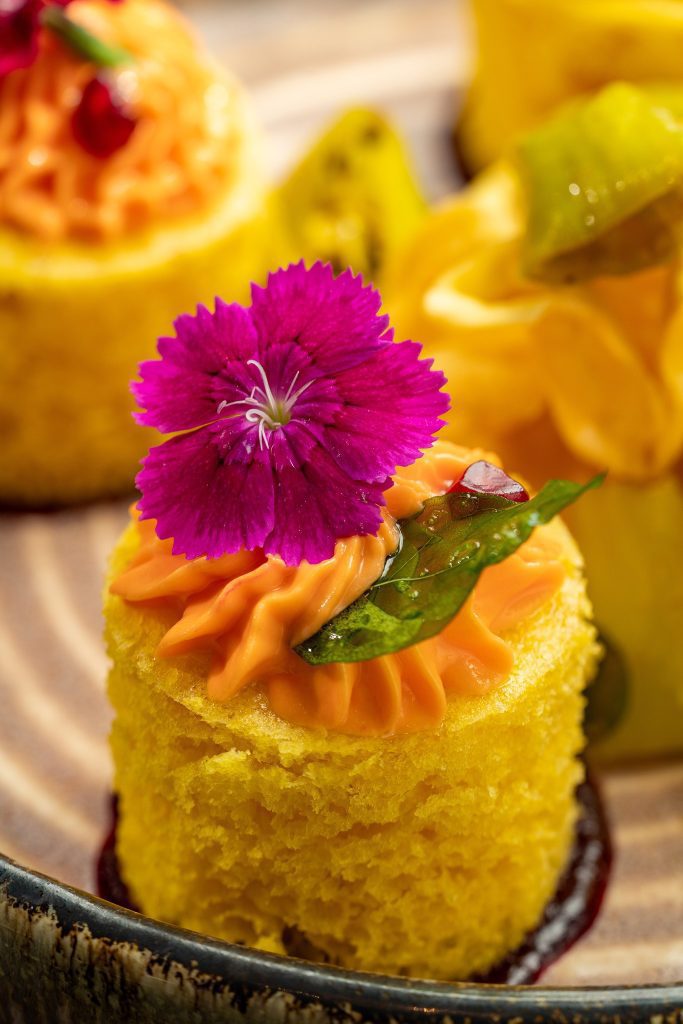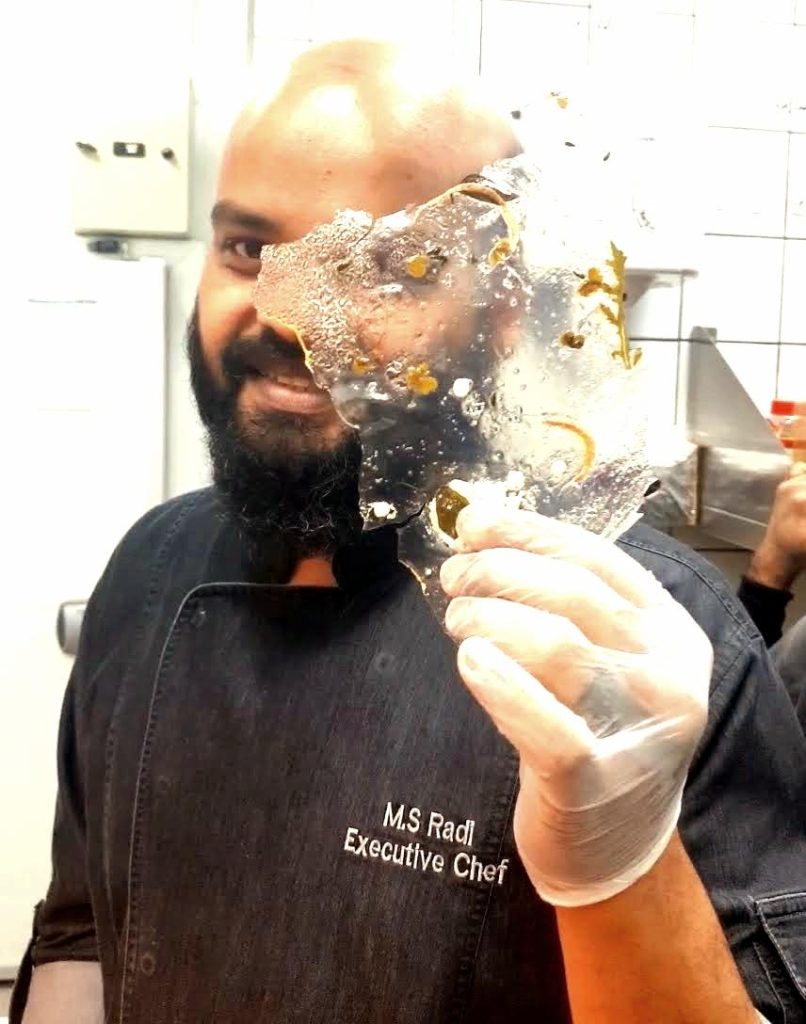(January 21, 2024) Chef Radi Manoj’s visiting card describes his designation as Flavour Architect/Bhoj Samrat. This attitude, where he truly loves what he does, shows up on the menu of Tevar – the Progressive Indian Kitchen and Bar, a restaurant in Knowledge City, one of Hyderabad’s newer corporate areas. From an avocado kulfi to a paan-based mocktail, Chef Radi Manoj’s food is all about contemporising Indian cuisine
From a CA to a Chef

Chef Radi Manoj
Chef Radi Manoj hails originally from Rajasthan, but grew up in Mumbai, wanting to be a chartered accountant. Even while doing his B.Com, seeing his older brother become a professional chef inspired him to want to do the same. He loved to sketch and paint, and occasionally cook, even as a child. He completed the first year of his CA course after graduating, then changed trajectories and gave the entrance exam for hotel management. On clearing it, he joined the Institute of Hotel Management in Bhopal, and loved every minute of it.
Sitting in a sunny corner of Tevar, Chef Radi tells Global Indian, “After my first year, I had to do an internship and I worked at ITC Maratha in Mumbai. I am not an introvert, but I was not comfortable interacting with people all the time. I preferred being in the kitchen and getting creative with dishes. I decided then that I wanted to be a chef.”
As part of campus recruitment, Chef Radi got offers from the Taj and the Oberoi Groups of Hotels, but he chose to go with Old World Hospitality, the company which later launched Indian Accent, by Chef Manish Mehrotra. He says, “I would call him my guru and mentor as a lot of what I create today is based on what he taught me. He is the pioneer of modern Indian cuisine. He always said, ‘Don’t fix what is not broken. Don’t make a Paneer Chettinad because that region doesn’t eat paneer. Don’t mix flavours for the sake of it; uplift a dish where possible.’ At Indian Accent, the clientele were global, well-travelled affluent people, so we had to give them new flavours, but nothing that seemed forced.”
Arabian Days and Nights
After four years and a lifetime’s worth of learning, a fluke call asking him to join another legendary chef – Sanjeev Kapoor – had Chef Radi moving to his company. With this job, he travelled all over India, setting up restaurant franchises for the brand. He would be travelling almost 300 days every year; and three-plus years later, he decided he wanted a change. He says, “I was not able to spend enough time with my family so I met Sanjeev and told him I wanted something less hectic. He suggested I go to Oman, where they were setting up five restaurants. I took it up and moved to the Middle East. Initially, I couldn’t understand Arabic food. I saw everyone relishing it but I didn’t find it flavourful. That doesn’t mean the food is bad; I didn’t have the palate for it. It was a learning curve because I got to learn about different Arabic flavours.” The Oman stint led him to Dubai to work with a company he later discovered wasn’t well-funded, but in the process, he met Ananda Kumar Pillai, an entrepreneur who invited him to set up a restaurant in Kuwait.
That move was a milestone for him as he worked on the concept for six months, and set up Agnii – a restaurant that serves Indian and Kuwaiti food. Today, the brand is a chain of eight uber successful restaurants. He says, “It was his concept; and we launched a 69-seater restaurant, of mostly Kuwaiti and some Indian food. We would do 350 covers a day. The concept was that of a central kitchen where the food was cooked and sent to the other venues, in refrigerated vans.” Each outlet had a smaller kitchen where the food would be thawed, heated and served. It did phenomenally well. “When we had leftover biryani, I would mix it with cheese and herbs and serve it as arancini balls. They became so popular that we had to make them as a dish and not just from leftover biryani.”
Indian Food with Attitude
Moving back to India after the second lockdown when his father passed away due to Covid, Chef Radi was still in two minds about going back to Agnii and Kuwait. He chose to stay back as his mother would be alone and he wanted his family nearby. Then he got a chance to launch Tevar – The Progressive Kitchen and Bar in Hyderabad, for entrepreneurs Narendra Pal Singh and Nikhil Dhawan. He says, “The owners had a clear vision – we would not serve fusion food, but Indian dishes in a contemporary way. No roti and sabji in a taco or a chicken tikka masala in pasta. It would be regional Indian food with a twist. I personally like to use indigenous ingredients that are the underdogs of Indian cuisine; like arbi, lotus stem and yam. We created a kakori kabab with lotus stem, and because it is so soft, we serve it on a piece of rusk. We make a galouti kabab with arbi – the methods for both are the same as the non-veg versions, but we use vegetables not normally associated with kababs. We serve bhel made with banana flower and an avocado kulfi with banana and honey.”
Even the ubiquitous samosa gets revamped in Chef Radi’s hands. Since most people like the crust, his version of the much-loved triangle of fried heaven is served as a tower of alternating layers of crust and filling. Needless to say, it is one of the most frequently ordered snacks at Tevar. Chef Radi loves pani puri so he had to put it on the menu here. And, in the 15 years of being in Hyderabad, it was the best I have tasted in this city. The waiter comes up with a wooden trolley and serves it at your table, just as a street vendor would – with different stuffings. Eating with one’s hands is encouraged and all the creations have an attitude – evident through their taste and garnish.

Chef Radi Manoj’s recreation of the samosa
His favourite ingredients are coconut and curry leaves and he prefers the minimalistic approach where he uses not more than eight to ten ingredients in his dishes.
A team effort
Frequently giving credit to his team of chefs, Chef Radi reiterates that they experiment with recipes and make them three or four days in a row. If he dislikes a dish one day and likes it the next, they tweak it further and then take a consensus on whether it should be on the menu. Having said that, he innovates considerably. The Katafi Paneer uses roasted vermicelli [katafi is the Arabic name for it and is popularly used for a dessert in Kuwait] and it is served with an orange reduction giving it a Mediterranean flavour. The Achari Paneer Tikka is marinated in a Rajasthan chilli pickle instead of the usual pickle masala. An Assamese style Black Chicken is cooked with black sesame seeds. A soft dhokla is served with slightly sweetened sour curd on top and a Malai Chicken Tikka is marinated in blue cheese. Paan leaves are used in a mocktail while a dash of vodka added to pani puri makes it a cocktail.

The dhokla at Tevar
The point is that Indian ingredients and methods of cooking are celebrated at Tevar unabashedly. There is a modern touch that gets added with flair which take regional Indian cuisine to the next level. And while the recipes keep evolving, Chef Radi would like his career graph to move towards launching his own restaurant some day. We hope the universe is listening.
While travelling, Chef Radi likes to eat at:
- Pune: Local street food
- Chennai: Thali at the Southern spice restaurant at Taj Coromandel
- Indore: Street food, Poha Jalebi and Makai Ki Kees
- Oman: Lamb Shuwa during the desert safari – the way they roast it in the ground is a unique experience.
- Follow Chef Radi Manoj on LinkedIn and Tevar on Instagram.
Also Read: Chef Apurva Panchal redefines soul food at Palo Alto’s progressive Indian restaurant, Rooh





